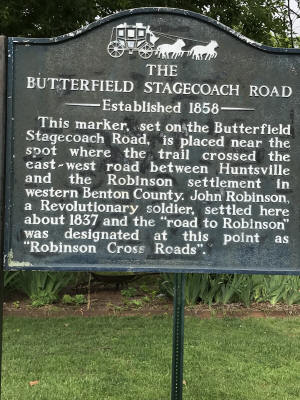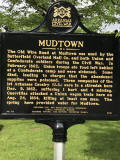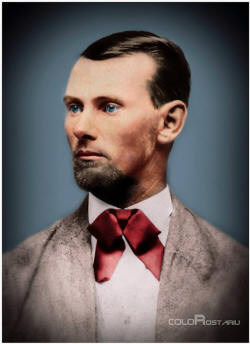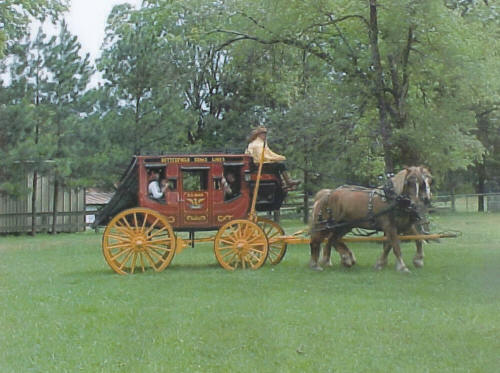|
MUDTOWN
THE STORY
In the beginning...
Lowell was a small community named
Bloomington. It was located along
Old Wire Road where the Butterfield
Stagecoach stopped. Bloomington was
known as "Mudtown" by many early
travelers due to their wagons
getting stuck in the muck and having
to be pulled out. In the Spring of
1881, the community of Bloomington
moved a short distance west to be
along the new railroad. This new
town was officially named Lowell.
The nickname "Mudtown" had stuck
with the community ever since.
People ask, "Where does the name "Mudtown
Days" come from?" This long ago
story gathered from local lore and
lifelong residents Elza Tucker and
Gene Graham contributed to the
explanation.
According to local legend, "Mudtown"
was a nickname for the little town
of Bloomington, which was on Old
Wire Road about a mile east of where
the town of Lowell is now located.
In order to make stagecoaches stay
longer, someone would make it
especially muddy so that the
stagecoach would get stuck. Legend
says that a new driver for the
Overland Butterfield Stage gave it
that name when he came out of Alex
nail's Tavern and Dram Shop and
found that the stage had sunk into
the mud up to the coach bed while he
and his passengers were refreshing
themselves.Mudtown residents blamed the muddy
ruts on the heavy lumber wagons
which hauled rough pine lumber from
Van Winkle's Sawmill, which was some
fifteen miles east of Rogers, to the
towns of Springdale and
Fayetteville. |

Marker for the original site of Bloomington "Mudtown" Arkansas.
(click image for a larger view) |
 The first post office in Bloomington
began operation in 1856 but there
was a settlement along Old Wire Road
many years before that time. In a
diary of Dr. William Isaac Irvin
Morrows, "Trail of Tears", he wrote:
"Wednesday, March 20, 1839 -
Traveled 15 miles to Cross (X)
Hollows. Ate dinner at Homedy's and
came on five miles to Fitzgeralds. A
mean House." The first post office in Bloomington
began operation in 1856 but there
was a settlement along Old Wire Road
many years before that time. In a
diary of Dr. William Isaac Irvin
Morrows, "Trail of Tears", he wrote:
"Wednesday, March 20, 1839 -
Traveled 15 miles to Cross (X)
Hollows. Ate dinner at Homedy's and
came on five miles to Fitzgeralds. A
mean House."
The Old Wire Road was a busy road.
It was the principal North-South
road of the region for freight
wagons and was on the main line of
the Butterfield Stage. Traveling
salesmen (known as drummers) tied
their horses at the hitching rack
then visited the tavern for
refreshment. Afterward they dropped
into the general store to replenish
their supplies for anything from
cheese and crackers to horseshoes
and chewing tobacco since the store
sold everything.
 Across the road from the Nail Tavern
was the Bloomington Hotel where
Jesse James spent most of one
winter, safe across the state line
from Missouri Sheriffs. No one
worried about Jesse James being a
frequent visitor to the town until
1928 when the Bank of Lowell was
robbed. Across the road from the Nail Tavern
was the Bloomington Hotel where
Jesse James spent most of one
winter, safe across the state line
from Missouri Sheriffs. No one
worried about Jesse James being a
frequent visitor to the town until
1928 when the Bank of Lowell was
robbed.
Mudtown had a hotel, church,
schoolhouse, Tavern and Dram Shop, a
general Store (which was also the
post office), blacksmith shop, and a
camping area for horse traders...but
no bank until 1881.
During the Civil War (1861-1865),
both sides used the horse traders
area as an Army Camp. On November
29, 1861, a Confederate Army of more
than 10,000 soldiers under General
Ben McCullough moved into winter
quarters one mile north of Cross
Hollows.
A muddy road was not unhealthy.
Uncle Alec Nail died January 24,
1920 at the age of 103. At his
funeral, the preacher said that
Uncle Alec would have lived to a
ripe old age if he didn't take a nip
of whiskey each morning before
breakfast. The widow, Henrietta
Nail, could stand on her front porch
and see the lights of her eight
sons' houses along Old Wire Road.
There was no joy in "Mudtown" when
the word came that the Frisco
Railroad would be built one mile
west of town. The railroad was
completed in 1881 and Mudtown talked
about moving, but nothing was done
for several months. About that time
a cyclone came along and decided the
question. The buildings left by the
cyclone were moved, and Bloomington
changed its name to Lowell. The
railroad depot was later moved to
Oklahoma.
Find out more about the history of
Mudtown. Visit the Lowell Historical
Museum at the Intersection of
Jackson and McClure.

|
New Page 1

Contact Us!
304 Jackson Place
Lowell, AR 72745 479-770-0191
Museum Hours
10:00am—2:00pm
1st & 3rd
Saturdays of the month
|